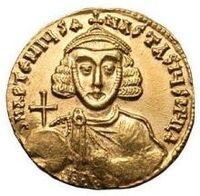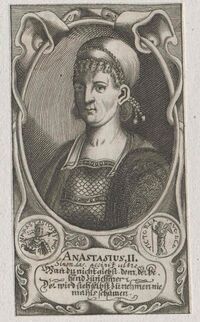Anastasius II
Good conspirators may become poor planners in a pinch. After all the effort to remove a leader you object to, you have no idea what to do next. Down with the tyrant! long live...er...who?
Such a situation happened in the Byzantine Empire in 713. A gang of soldiers had successfully deposed and blinded Emperor Philippicus Bardanes, but had no concept of who should replace him. As Phil bled all over the showers from the eye sockets in the chariot racetrack in Constantinople's Hippodrome, his disfigurers argued over who should come next. Another soldier-ruler? or a civilian this time? They chose a civil servant by the name of Artemius Pyle. He had been Bardanes' main secretary and diary-keeper, and also part-time musician. Artemius initially refused, as the previous four emperors had been executed and Bardanes was showing every sign of becoming Number Five. But, surrounded by men who would kill him as a mere pretence to move on to another candidate, he relented, holding out only for a change of name, to Anastasius II.[1]
Background[edit]
Anastasius came from a long line of quill-ticklers. He got on the Byzantine Imperial government payroll and managed to stay out of trouble under several bosses, giving no clue that he had any ambition at all. He married a local sweetheart called Irene and looked forward to a nice comfy pension when he retired, playing a few gigs with his band, a Byzantine Lynyrd Skynyrd. His neighbours in Bosphorus Sea View villas were obliged to hear Anastasius and the boys sing Sweet Home Asia Minor and Free Birdie Song essentially on an endless loop. When they could not get to him to shut up, his residence was gated, guarded and moated.
It was not to be, after the mutilation of Bardanes. The New Rome needed a saviour, so why not a fat civil servant and his boring wife to take that on? Anastasius's next gig was as the Emperor.
Emperor[edit]
Though no soldier, Anastasius was no chump either. What if those Byzantine soldiers who had killed his boss got bored and sought to replace him as well? Anastasius neatly called aside the two main ringleaders and had them blinded in turn. Bardanes may have been a crap emperor, but there was a way to do these things.
The situation in the East began to look dire. Anastasius had no need for the new religious ideology either, and banished Monothelitism from talk around the table. He wrote a letter of apology to Rome for the recent upheavals. Pope Constantine accepted Anastasius's diplomatic grovel and wheedled out some tax exemptions. A schism had been avoided.
Anastasius needed some handy military victories to boost his popularity. He wasn't a general but picked winners to work for him. The enemies of the day were the Bulgars and the Arabs. The reports under the previous emperor said to prepare for something big from the Umayyad Caliphate, headquartered in Damascus. He would strike first, and send the Bulgars some nice shiny presents to stay quiet.
Anastasius planned a combined naval and military attack. For the latter he promoted a promising and experienced soldier called Konon or perhaps 'Conan'. He would become Emperor Leo the Iconoclast, but at this point, he was not yet breaking anything. The problem came from the navy. The sailors rebelled when the fleet was in Rhodes, killed Anastasius's commander and pointed their ships back towards Constantinople. On their way back to the capital, the mutineers selected their own emperor, a charisma bypass called Theodosius III. He was an imperial civil servant like Anastasius, working in Inland Revenue.
Deposition[edit]
The rebel navy arrived outside Constantinople, but they were not met by a matching uprising in the city. It was going to be another siege. For the next six months, the rival sides largely exchanged insults rather than a lot of arrows or other projectiles. Anastasius had already moved his army to Nicaea, as he had expected Theodosius to attack from that direction.
Anastasius hoped for succour from Bulgaria but, after all, he had paid them to stay at home. With the opposition staying strong, Anastasius opened communication with Theodosius to see if there was a deal to be had. There was. If Anastasius stepped down and resigned, he would keep his eyes, nose, and most other extremities.
Anastasius carried on resisting Theodosius from his new makeshift capital but was finding it hard to recruit supporters. His star commander Konon/Leo the Iconoclast remained out East. So again Anastasius approached Theodosius for a 'new deal'. Theodosius reasserted the same conditions, though Anastasius would have to retire from public life and move to a monastery. His wife Irene would keep the villa. Anastasius reluctantly took the offer. In a humiliating ceremony, he was divested of his imperial designer clothes and had them replaced with the Greek Orthodox Monastic Black.
Aborted return[edit]
Anastasius stayed in his monastery when the Arabs besieged Constantinople. By this time, his successor Theodosius III had met the same fate as he, consigned to a monastery (a different one) by the new emperor, Leo the Iconoclast. Being a monk was no fun for Anastasius. Perhaps he could find a new ally? How about the Bulgarians? He sent them a letter making promises if restored as emperor.
In the meantime, Leo had won a great victory against the Arab armies, helped by the Bulgarians. Perhaps one of them tipped off Leo that Anastasius was thinking about a comeback. The former emperor bunked off from holy duties and headed towards the Bulgar kingdom. Anastasius managed to recruit an army of malcontents who had various beefs with Leo. But Leo was too quick. He arrived in strength before Anastasius could gather a bigger force. Anastasius's troops deserted him and he was delivered in chains to Leo. Anastasius probably promised to 'be a good boy in future' but the grim Leo was in no mood to be generous. Anastasius was dragged away; the extremity they elected to remove was his head. His widow Irene was allowed to say her last goodbyes and bury her husband's body. She kept the luxury villa.
References[edit]
- ↑ Carrying a name like 'Artemius' suggested you were a pagan.
| Preceded by: Philippicus Bardanes |
Byzantine Emperor 713-715 |
Succeeded by: Theodosius III |



